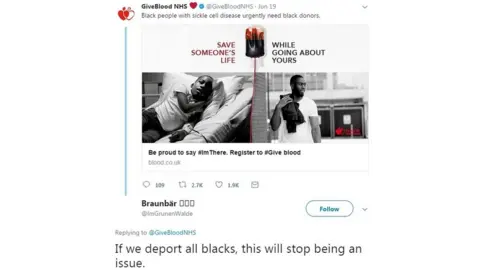NHS praised after racist tweet about sickle cell disease sufferers
 BBC
BBCThe NHS has been praised for its response to a racist comment on Twitter regarding black blood donors.
NHS Blood and Transplant tweeted an appeal for more black donors to help black people with sickle cell disease.
A user replied "If we deport all blacks, this will stop being an issue". The NHS responded: "OR.. we could just deport you.".
An NHS spokesman said: "There is no place for any kind of racism within our online communities".
The offending tweet has since been removed.
Hundreds of people have tweeted in support of the organisation's response, with many saying it has encouraged them to give blood.
Bec Awuor tweeted: "Going to sign up now, this has definitely given me the push to do so thank you for this! Love from a girl who is Black AND English."
Liz Lindley said: "Not only is it game, set and match to @GiveBloodNHS they have won the tournament, new balls please."
And Caroline Crossland posted: "Seriously, one of the best Tweets EVER. Donating on the 18th - will be doing so with an even bigger grin on my face now!"
 Science Photo Library
Science Photo LibraryNHS Blood and Transplant, which has centres in Bristol and Plymouth, said: "Donors from all backgrounds are fundamental to our life-saving work.
"There is no place for any kind of racism within our online communities and we do not tolerate abusive and offensive behaviour."
A spokesman said currently only 1% of active blood donors in England were from black or mixed race communities.
Black donors are more likely to have rare blood and tissue types and black patients are more likely to require these rare types, he said.
People from black communities can also be susceptible to conditions, such as sickle cell disease, which leave them requiring regular transfusions.
In these cases, blood from donors with a similar ethnic background can provide the best match and better outcomes in the long term.
